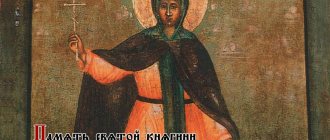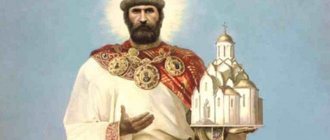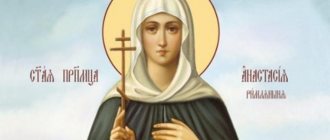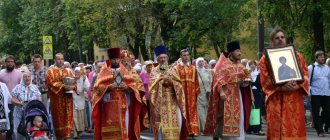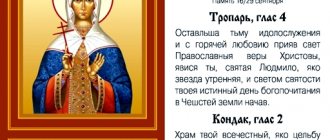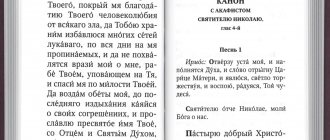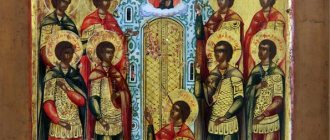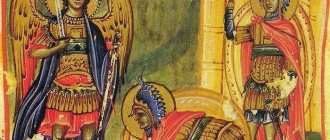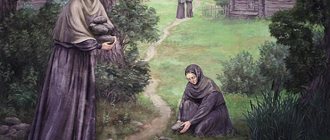The life and torment of the long-suffering Job
In the Holy Scriptures there is a story about the righteous Job, who lived 1.5-2 thousand years before the birth of the Savior. The Book of Job is part of the Old Testament and the Hebrew Bible (Tanakh). The poetic and highly artistic form of presentation enhances the meaning of the work.
Job was a pious, God-fearing man who did the will of the Lord and did not allow sinful thoughts. The biblical text indicates that he lived in the north of Arabia, a descendant of Abraham (in the sixth generation).
The Lord blessed the sinless worshiper and rewarded him generously. Job was successful in everything: rich harvests in the fields, fat herds increased his wealth.
God's righteous beloved was happy in his sons: seven sons and three daughters lived together, distinguished by their beauty, health and hard work. Once a week, Job made a sacrifice to God to atone for the sins of his children if they were guilty of something. His neighbors respected him for his honesty and wisdom.
One day, angels appeared before the Lord, among whom was the devil. Satan boldly boasted to God of his power over people. The Lord gave him Job as an example, as a God-fearing man, alien to vices. To which Satan objected that pity would disappear if the righteous were deprived of their wealth. Having become a beggar, he will complain about his fate and about God.
God told him that he had accepted the devil's test of Job's strength of faith. He gave him into the hands of Satan, forbidding him from harming him personally. Soon the righteous lost their wealth, and their children died from disease. Having become a beggar, he offered a prayer in which he glorified God: “God gave, God took away. Everything is in God's hands." The pious name of the Lord was not profaned by word or thought.
Once again the angels and Satan appeared before the Heavenly Throne. The Lord asked him if he was sure that there were people on earth who were strong in faith. The devil objected to God that God’s servant remains righteous because he is not tormented by physical suffering. The Lord allowed Satan to test his faithful admirer with a serious illness, but not to touch his soul (not to take his life) and mind.
Satan unleashed leprosy on a pious man, who disfigured him from head to toe. The leper was forced to leave the village, choosing a pile of dung as his habitat. In order not to starve herself and make her husband die, the wife was forced to be hired as a worker. She believed that the misfortunes that befell their family were due to the sinful actions and thoughts of her husband.
His wife cried and reproached Job, asking him to repent before God. Seeing how much her husband was suffering, she could not resist and suggested that he repay the Lord and then die. But Job objected to her that not only rewards, but also trials should be accepted from God. The sufferer also believed that evil came from the Lord, but he humbly accepted his punishment.
The rumor about the sudden misfortune of the righteous man reached his three friends. They decided to support Job in difficult times and came to him. Seeing the situation in which he found himself, his speechless friends began to mourn the unfortunate man. The sufferer could not bear their tears and with great pain cursed the day when he was conceived and born into the light of God. His friends began to convince him that God was righteous, and the Lord's punishment meant that Job was guilty of something before this Man. He must repent of his sins and God will have mercy on him.
Long-suffering Job could not remember how he could anger the Creator. He began to reproach his friends, who upset him with their suspicion of vices and sins. In vain the unfortunate man tried to convince them that he was not guilty of anything before the Lord, that it was not for people to judge what the will of God was. In a state of spiritual pain, the righteous turned to the Lord to give a sign to people about the absence of sin.
Suddenly a strong whirlwind arose. In it, the Lord appeared to a faithful servant and reproached him for trying to understand with his own mind the meaning of divine destiny. Job was overcome with deep repentance and found himself unworthy, worthy of dust and dust. Job's friends began to pray to God for forgiveness, but he did not accept their repentance and made it clear that they could only receive it through Job, who would act as an intercessor. The kind-hearted righteous man made a sacrifice and asked God for mercy for his friends. God accepted her intercession.
He restored the health of his faithful slave and made him twice as rich as before. The righteous man had 7 sons and 3 daughters. Having survived the suffering, God extended his life by 140 years. Job saw his descendants up to the 4th generation.
The prophecy of monk Abel about Tsar Nicholas II
Emperor Pavel Petrovich asked the monk Abel to tell who the royal rule would be transferred to after his great-grandson, Alexander III.
Abel answered:
“To Nicholas II - the holy king, like the long-suffering Job. He will have the mind of Christ, long-suffering and dove-like purity. Scripture testifies about him: Psalms 90, 10 and 20 revealed to me his whole fate. He will replace the royal crown with a crown of thorns; he will be betrayed by his people, as the Son of God once was.
The Redeemer will be, he will redeem his people - like a bloodless sacrifice. There will be a war, a great war, a world war. People will fly through the air like birds, swim under water like fish, and begin to destroy each other with foul-smelling brimstone. On the eve of victory, the royal throne will collapse. Treason will grow and multiply.
And your great-grandson will be betrayed, many of your descendants will whiten their clothes with the blood of a lamb in the same way, a man with an ax will take power in madness, but then he himself will cry. The Egyptian execution will truly come. Blood and tears will water the damp earth. Bloody rivers will flow. Brother will rise up against brother."
Modern historians and Orthodox researchers are extremely cautious about the prophecies of Abel . Thus, they note that in his predictions he expressed heretical judgments and even said that his visions could be of demonic origin.
For example, the statement about Nicholas II as the redeemer of the Russian land is considered heretical. While Scripture and the Church speak of only one redeemer - Christ. Moreover, there is no evidence that the 20th century prophecies attributed to Abel were made by him.
Interesting fact
Nicholas II was born on the day of remembrance of St. Job the Long-Suffering.
The meaning of a saint in Orthodoxy
Job lived before the prophet Moses, before the time when God gave the covenant to the chosen people. Ancient interpreters of the Old Testament assigned a special place to the Book of Job.
The story of the righteous is a prototype of Christ, the sinless sufferer who atoned for human sins with his death.
God knew that no man on earth loved him as much as Job. But this allowed Satan to tempt his most faithful servant. The Lord provokes the devil to prove his power over him, but he imposes restrictions on him: do not deprive him of his life and mind. Sudden and inexplicable suffering has driven the pious and God-fearing man into despair, and he cries out to God, not understanding the reasons for his anger and cursing his birth.
Christian commentators, including Orthodox Christians, view the suffering of the biblical ancestor as a path to spiritual self-improvement, strengthening faith and getting closer to God. The Lord allowed such trials so that the righteous would become individuals. A perfect one who not only listened but also saw the Lord.
From the history of the long-suffering righteous it follows that the suffering of sinners and righteous people has different causes and consequences. God's punishment for sins forces people to come to church to find spiritual support in misfortunes and illnesses, to get rid of vices. For the righteous, physical and mental suffering is the path to spiritual self-improvement, which includes two aspects: unshakable faith, love for God and enduring humility. Job is an example for believers of how to endure adversity in order to prepare for future eternal life and an encounter with God. It is a symbol of hope found through suffering.
***
The Book of Job was not written to answer all our questions about the evil in our world. Its main character is an example of a person who cannot imagine life without unity with a loving and just Creator. If Job’s happiness had been only material, he would have renounced God without hesitation. But Job was fabulously rich spiritually and morally. And therefore he was not burned in the fiery test.
The amazing book of Job teaches us that if we live a holy and righteous life, then our suffering provides an opportunity to glorify God and man. God - as the one who always loves us and is worthy of reciprocal love, and man - as his best creation on earth, the true image and likeness.
Victor Glebov
Iconography
On the frescoes of the 3rd-4th centuries, the image of the saint is reminiscent of ancient philosophers. Put on a short tunic and stand on a rock or sit on a chair. During the same period, the saint appears on the reliefs of sarcophagi as an illustration of the biblical text. Job sits on a chair, next to his wife (alone or with friends), offering him food on a stick, covering his nose with the hem of his clothes.
On the icons, Saint Job is in rich clothes, with gray hair, with a gray curly beard, with a scroll in his hands or with outstretched palms. There are no characters from the Book of Job next to him.
The most famous painting
One of the most famous paintings depicting the great sufferer is the canvas “Job and His Friends” by Ilya Repin . The master created a masterpiece while receiving the title of free artist in 1869.
Job and his friends - Ilya Efimovich Repin. 1869. Oil on canvas. 133 x 199
The painting shows Job's friends coming to express their condolences to him. Although no one's tears are visible, fear and sadness are clearly felt in everyone.
- The artist captured Job sitting on the ruins of his once luxurious home.
- Job's shoulders slumped. There is grief and doom on his face.
- There is confusion and bewilderment on the faces of friends.
- Behind Job, his wife is visible, holding her head and encouraging him to repent of his sins.
Prayer
O great righteous man, the very suffering Job, with his pure life and holy closeness to God, radiant. You lived on earth before Moses and Christ, but you fulfilled all the commandments of God, carrying them in your heart. Revealed to the world through Christ and His holy apostles, the mysteries, deeply understood through their revelations, could be co-inspired by the Holy Spirit. All the malice of the devil, in the special temptations sent to you by the Lord, for the true humility of your worship, the image of the malice and long-suffering of the entire universe appeared. Loving your faith in God and all people in their immeasurable sorrows, keeping with a pure heart beyond the grave unity with God, she joyfully waited for you. Now you live in the villages of the righteous and stand before the Throne of God. Hear us about the sinners and the irresponsible who appear before your holy icon and who carefully resort to your feet. Pray to God the Lover of Mankind, that strong faith, inviolability and inviolability may be received from every evil enemy, visible and invisible protection, in pain and temptations that we give with Strength, in our hearts the memory of death is always kept, long-suffering and brotherly loved, strengthened and bestowed us the final judgment of Christ, give us a good answer, and in the resurrected plan of our one and triune God behold and glorify Him with all the saints to sing to the ages of ages. Amen.
